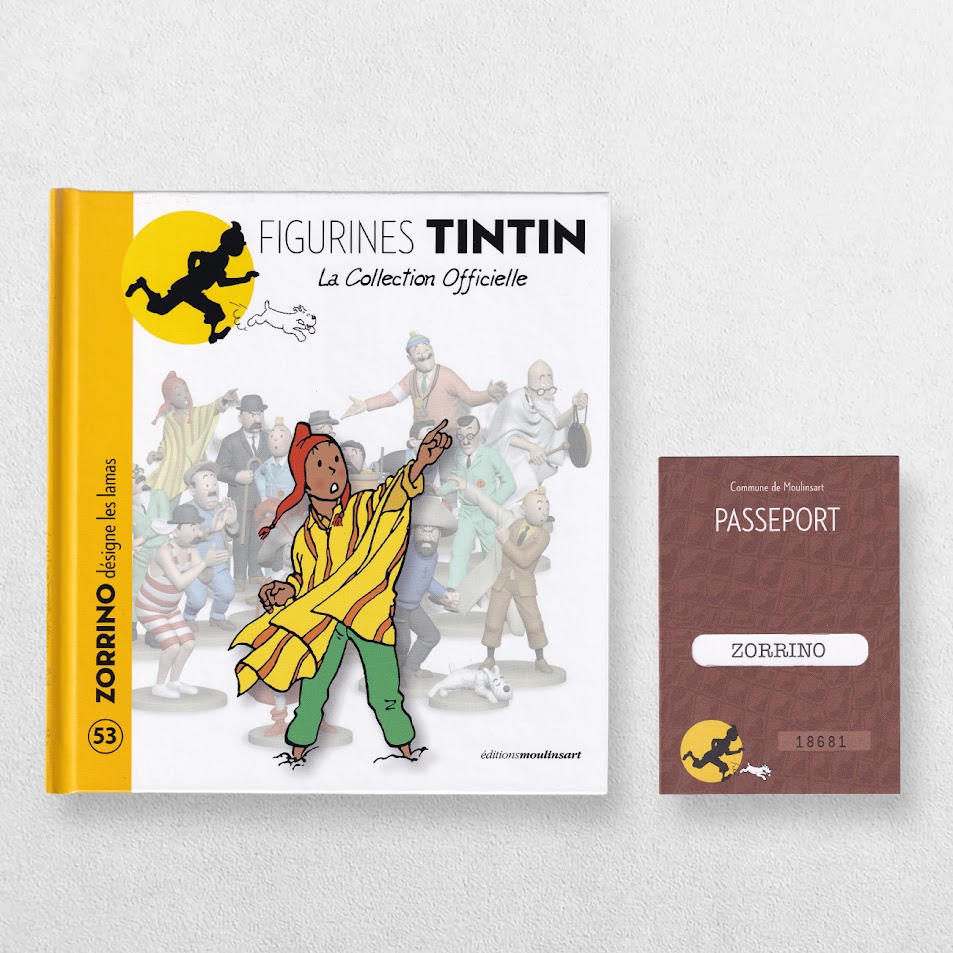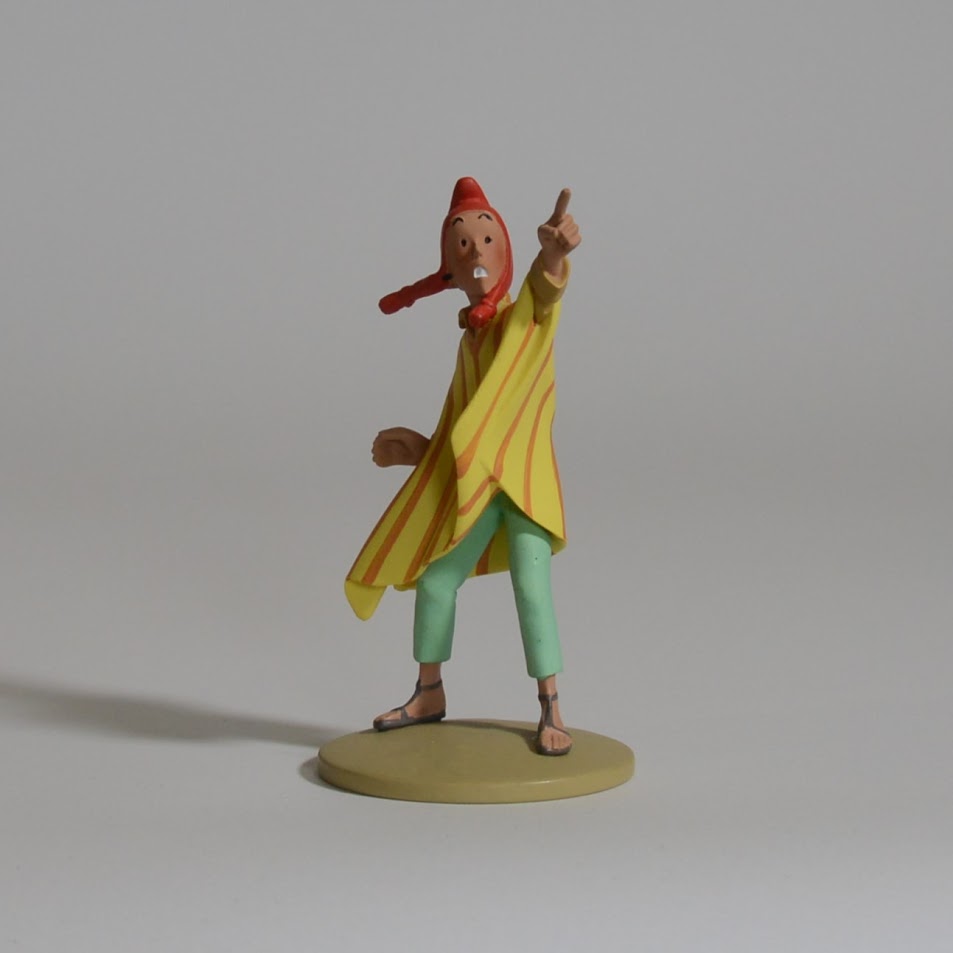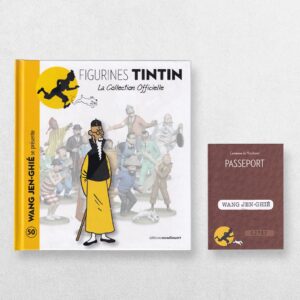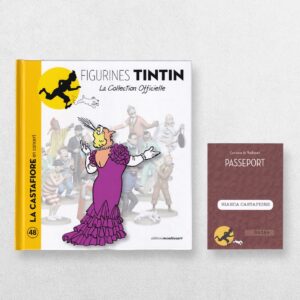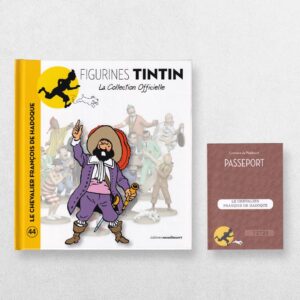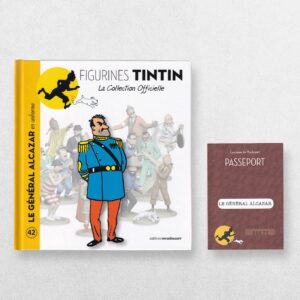Zorrino Points Out The Llamas – Figurines Tintin La Collection Officielle – 53 – Zorrino Désigne Les Lamas
Hergé & Editions Moulinsart
£80.00
Availability: In stock
Product Description
Zorrino Points Out The Llamas – Figurines Tintin La Collection Officielle – 53 – Zorrino Désigne Les Lamas
Author: Hergé & Editions Moulinsart
Price: £80.00
Publisher: Editions Moulinsart
Publication date: 2013
Format: Original pictorial boards with passport and figurine
Condition: In near fine condition
Illustrations: Illustrated throughout
Description:
Original pictorial boards. Includes passport loosely inserted. Text in French. Includes the accompanying figurine. One from the collection of 111 books and figurines. Very slight wear. In very near fine, clean condition overall.
Zorrino: A Short Biography
Zorrino is a young Quechua boy from Peru who appears in Prisoners of the Sun (Le Temple du Soleil, first published 1949), the continuation of The Seven Crystal Balls. He serves as Tintin’s local guide and companion during his perilous journey through the Andes in search of Professor Calculus.
Zorrino is one of Hergé’s most human and sympathetic secondary characters — a figure of courage, dignity, and loyalty. His story reflects Hergé’s growing moral awareness and empathy toward non-European cultures, marking a major step in the series’ evolution from colonial adventure to humane exploration.
Character Overview
Zorrino is introduced in the town of Jauga, a settlement high in the Andes. He is a poor, orphaned boy who ekes out a living by selling oranges. When Tintin and Captain Haddock encounter him, he is being bullied and humiliated by two Europeans — a moment that becomes a key turning point in the story.
Tintin intervenes immediately, defending Zorrino and treating him with kindness and respect. Deeply moved by this rare act of compassion, Zorrino later reappears to repay Tintin’s courage by guiding him to the lost Temple of the Sun, hidden deep within the mountains and guarded by descendants of the ancient Incas.
Through Zorrino’s courage and loyalty, Tintin and Haddock are able to reach the temple and ultimately save Professor Calculus from execution.
Role in Prisoners of the Sun
After Tintin rescues him, Zorrino offers to lead Tintin and Haddock through treacherous mountain passes to find the kidnapped Calculus. Their journey is fraught with peril — avalanches, exhaustion, altitude, and pursuit by the Inca priests who seek to prevent outsiders from discovering their hidden civilisation.
Zorrino proves resourceful, brave, and selfless throughout. Despite his youth, he shows deep knowledge of the terrain and unwavering commitment to Tintin. His guidance saves the group on multiple occasions.
When they finally reach the Temple of the Sun, Zorrino is recognised by the Inca priests as one of their own people. His faithfulness to Tintin earns him mercy: while Tintin and Haddock are sentenced to death, Zorrino is spared and later helps intercede on their behalf.
By the story’s end, he is granted the rare privilege of remaining within the Inca sanctuary — symbolising both acceptance and the preservation of his cultural identity.
Personality and Traits
Zorrino is defined by humility, bravery, and integrity:
- Loyalty: His devotion to Tintin stems not from obligation but gratitude and friendship.
- Courage: He faces danger without hesitation, guided by instinct and moral conviction.
- Intelligence: He possesses deep local knowledge, understanding both the geography and the traditions of his people.
- Pride: Despite his poverty, he carries himself with quiet dignity, embodying self-respect and resilience.
Zorrino’s goodness is simple and instinctive — he acts out of kindness, not heroism — which makes his character one of Hergé’s most authentic portrayals of moral virtue.
Symbolism
Zorrino’s story carries rich symbolic meaning within Prisoners of the Sun:
- The Innocent Guide: Like many figures in mythology and literature, Zorrino functions as the pure-hearted guide who leads the hero toward enlightenment. His simplicity and faith balance Tintin’s reason and Haddock’s emotion.
- Cultural Bridge: Zorrino connects the European protagonists to the ancient Andean world. Through him, Tintin encounters the Incas not as “others” or “natives,” but as human beings with their own dignity and wisdom.
- Redemption and Respect: His elevation at the end of the story — accepted into the Inca sanctuary — symbolises the restoration of honour to an oppressed people. Hergé’s portrayal of Zorrino reflects his growing respect for indigenous culture, a far cry from the stereotypes of Tintin in the Congo (1931).
Relationship with Tintin and Captain Haddock
Zorrino’s relationship with Tintin is built on mutual trust and equality. Tintin treats him not as a servant or subordinate but as a friend and moral equal — an attitude that was rare in European adventure fiction of the 1940s.
With Captain Haddock, Zorrino’s bond is more humorous. Haddock’s bluster and impatience often clash with Zorrino’s quiet composure, yet their mutual affection grows as they endure hardships together. Haddock’s eventual defence of the boy from an Inca guard shows his respect and affection.
Artistic and Narrative Significance
Hergé’s depiction of Zorrino is both tender and realistic. The Andean landscapes are drawn with precision and majesty — snow-capped peaks, winding trails, and the solemn grandeur of Inca ruins — all filtered through Zorrino’s knowledge and perspective.
Zorrino’s facial expressions — wide-eyed determination, fear, and gratitude — are rendered with genuine empathy. His presence softens the story’s tension, grounding its supernatural and historical elements in human emotion.
Through Zorrino, Prisoners of the Sun achieves a balance between adventure, mythology, and moral depth.
Cultural Context
When Hergé wrote Prisoners of the Sun, European depictions of indigenous peoples were still often condescending or exoticised. Influenced by his growing humanist outlook — and by his collaboration with researchers and travel writers — Hergé chose to portray the Incas and their descendants with dignity, intelligence, and spiritual depth.
Zorrino, as a representative of that heritage, is neither a comic servant nor a mystic symbol. He is a boy — frightened, brave, and kind — whose humanity transcends race or culture.
This portrayal marks one of Hergé’s greatest artistic and ethical leaps: a clear rejection of the colonial attitudes that shaped his early work.
Legacy
Although Zorrino appears in only one Tintin adventure, his influence is lasting. He stands among the most respected and beloved secondary characters — alongside Chang and General Alcazar — as a figure who enriches Tintin’s moral world.
His story embodies one of the core themes of The Adventures of Tintin: that compassion and respect can bridge the deepest cultural divides.
Zorrino also serves as a reminder of Hergé’s moral development as an artist — from depicting stereotypes to celebrating shared humanity.
Summary
- Full name: Zorrino (no surname given)
- Origin: Quechua, from the Andes, Peru
- First appearance: Prisoners of the Sun (1949)
- Occupation: Street vendor and mountain guide
- Traits: Loyal, brave, humble, intelligent, and honourable
- Symbolism: Represents purity, friendship, and cross-cultural understanding
- Role: Guides Tintin and Captain Haddock to the hidden Temple of the Sun
- Fate: Accepted into the Inca sanctuary at the story’s end
Conclusion
Zorrino is one of Hergé’s most humane creations — a boy whose courage and integrity illuminate Prisoners of the Sun. Through him, Tintin learns that kindness transcends borders, and readers encounter one of the most respectful portrayals of indigenous character in early European comics.
Quiet, brave, and loyal, Zorrino embodies the moral heart of Hergé’s mature vision: the belief that true heroism lies not in conquest, but in compassion and dignity.
Why Buy from Us?
At Hornseys, we are committed to offering items that meet the highest standards of quality and authenticity. Our collection of objects and rare books are carefully curated to ensure each edition is a valuable piece of bibliographical history. Here’s what sets us apart:
- Authenticity and Provenance: Each item is meticulously researched and verified for authenticity and collation.
- Expert Curation: Our selection process focuses on significance, condition, and rarity, resulting in a collection that is both diverse and distinguished.
- Customer Satisfaction: We aim to provide an exceptional customer experience, from detailed descriptions to secure and prompt delivery of your purchase.
- Returns Policy: We offer an unconditional guarantee on every item. If you wish to return an item, it may be sent back to us within fourteen days of receipt. Please notify us in advance if you wish to do so. The item must be returned in the same condition as it was sent for a full refund.
Cataloguer: Daniel Hornsey
Daniel Hornsey has specialised in fine and rare books, ephemera, and collectors’ editions for over thirty years. As a long-standing member of the antiquarian book trade, he has advised private collectors, curated catalogues, and sourced works for leading dealers, libraries and institutions across the world.
Hornseys’ exhibit regularly at book and map fairs in London and throughout the UK and are members of the Provincial Booksellers Fairs Association, the PBFA.
His fascination with Hergé’s work — especially ‘The Adventures of Tintin’ — began in childhood. Daniel recalls reading Tintin in original European editions and quickly recognising that these were not merely children’s books, but finely illustrated narratives crafted with artistic depth and wit.
As noted by the Musée Hergé in Louvain-la-Neuve, Hergé’s ‘ligne claire’ style has influenced generations of European comic artists and his original drawings and paintings command very high prices with his painting of ‘The Blue Lotus’ jar fetching £2.8m at auction in 2021.
By presenting these works through Hornseys’, he hopes to contribute to the continued appreciation of one of the 20th century’s most influential illustrators, helping new generations discover the artistry and legacy of Hergé.
Related products
Paddington Marches On With Card Signed By Michael Bond Loosely Inserted
£545.00Bond, Michael Illustrated By Fortnum, Peggy
You may also like…
Mr Wang Introduces Himself – Figurines Tintin La Collection Officielle – 50 – Wang Jen-Ghie Se Présente
£60.00Hergé & Editions Moulinsart
Castafiore In Concert – Figurines Tintin La Collection Officielle – 48 – La Castafiore En Concert
£45.00Hergé & Editions Moulinsart
Sir Francis Haddock – Figurines Tintin La Collection Officielle – 44 – Le Chevalier François De Hadoque
£95.00Hergé & Editions Moulinsart
General Alcazar In Uniform – Figurines Tintin La Collection Officielle – 42 – Le Général Alcazar En Uniforme
£45.00Hergé & Editions Moulinsart
Colonel Sponsz Upset – Figurines Tintin La Collection Officielle – 37 – Le Colonel Sponsz Contrarié
£55.00Hergé & Editions Moulinsart
Monsieur Boullu The Stonemason – Figurines Tintin La Collection Officielle – 35 – Monsieur Boullu Le Marbrier
£40.00Hergé & Editions Moulinsart
Haddock Alpinist – Figurines Tintin La Collection Officielle – 34 – Haddock En Alpiniste
£45.00Hergé & Editions Moulinsart
Calculus The Gardener – Figurines Tintin La Collection Officielle – 28 – Tournesol En Jardinier
£35.00Hergé & Editions Moulinsart
Haddock As Hadoque – Figurines Tintin La Collection Officielle – 24 – Haddock En Hadoque
£45.00Hergé & Editions Moulinsart
Ridgewell The Explorer – Figurines Tintin La Collection Officielle – 23 – Ridgewell L’Explorateur
£45.00Hergé & Editions Moulinsart
Tintin In Kilt – Figurines Tintin La Collection Officielle – 22 – Tintin En Kilt
£65.00Hergé & Editions Moulinsart
King Muskar Puts On His Gloves – Figurines Tintin La Collection Officielle – 20 – Le Roi Muskar Enfile Ses Gants
£45.00Hergé & Editions Moulinsart
Snowy Stuck In The Crab Tin – Figurines Tintin La Collection Officielle – 19 – Milou Coincé Dans La Boîte De Crabe
£45.00Hergé & Editions Moulinsart
Nestor With The Tray – Figurines Tintin La Collection Officielle – 18 – Nestor Au Plateau
£45.00Hergé & Editions Moulinsart
Chang Points Out Hou Kou – Figurines Tintin La Collection Officielle – 8 – Tchang Indique Hou Kou
£35.00Hergé & Editions Moulinsart
Tintin In A Lunar Spacesuit – Figurines Tintin La Collection Officielle – 7 – Tintin En Scaphandre Lunaire
£55.00Hergé & Editions Moulinsart
Snowy Carries His Bone – Figurines Tintin La Collection Officielle – 6 – Milou Promène Son Os
£40.00Hergé & Editions Moulinsart
Castafiore With The Parrot – Figurines Tintin La Collection Officielle – 5 – La Castafiore Au Perroquet
£75.00Hergé & Editions Moulinsart
Thomson Looking Awkward – Figurines Tintin La Collection Officielle – 4 – Dupond Engoncé
£40.00Hergé & Editions Moulinsart
Professor Calculus With A Spade – Figurines Tintin La Collection Officielle – 3 – Tournesol A La Bêche
£40.00Hergé & Editions Moulinsart
Haddock Doubtful – Figurines Tintin La Collection Officielle – 2 – Haddock Dubitatif
£40.00Hergé & Editions Moulinsart
Tintin In Trenchcoat – Figurines Tintin La Collection Officielle – 1 – Tintin En Trench-Coat
£75.00Hergé & Editions Moulinsart

